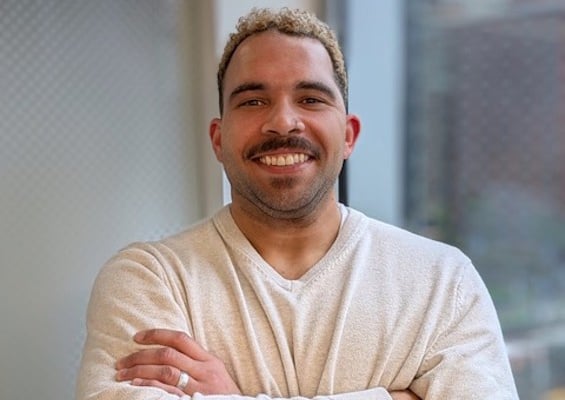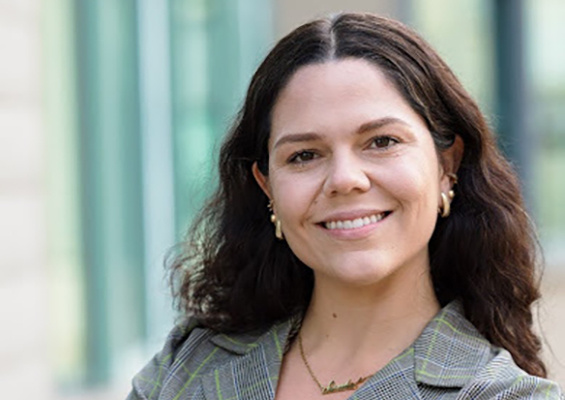When deciding whether or not to pursue an MBA, the biggest obstacle for Laura Teclemariam, EMBA 18, was her own self-doubt. She pushed through her fears because she realized there’s immeasurable value when you make the decision to invest in yourself.
Laura recently shared her story of resilience with a virtual room of a few hundred prospective MBA students during the annual Berkeley Haas Diversity Symposium.
She started by asking the group what myths they’d heard (or even believed themselves) about getting an MBA. These common misconceptions were shared:
- An MBA is a waste of money.
- The tuition investment isn’t worth it.
- You don’t need it.
- You have to have a business background.
- Employers value real-world experience more.
- You need a high GMAT score to get in.
- You need a 4.0 GPA from undergrad.
Laura had many of the same fears before deciding to pursue her MBA at Berkeley Haas. “Know you’re not alone and that someone in this group feels the same way you do about what it means to get an MBA,” she said.
Decide you're worth the investment
Laura said, “In undergrad, I wasn’t the valedictorian. I got a computer science electrical engineering degree; I didn’t know business or finance. Every time I walked into a corporate room, nobody looked like me—and as an engineer, they definitely didn’t look like me. ”
Nobody in Laura’s close community had an MBA, so when she approached her friends and family to ask what they thought of the idea, she received a lot of hesitation.
- The MBA costs too much money.
- You already have a job in entertainment that most people need an MBA for.
- You’re too old to get an MBA.
- Do you think the MBA is worth the stress of being away from your kids?
Laura asked the group the questions that helped shift her perspective, “How many of you have stocks or have bought a house? How many of you workout and eat healthy? How many of you read books because you want to learn more? What you’re doing when you’re doing all of those activities is you’re investing in yourself. So that’s the first thing I want you to think about. Ask yourself right now, ‘Am I worth it?’”
Lean on and learn from others
Laura also admits she faced imposter syndrome—not just when deciding whether or not to get an MBA—but also when she first started the MBA for Executives program at Berkeley Haas.
Imposter syndrome is defined as a psychological pattern in which an individual doubts their skills, talents, or accomplishments. It’s a phenomenon that isn’t always talked about openly because people are either unaware they’re experiencing it or are hesitant to admit it, but it’s something that commonly affects MBA students. “Imposter syndrome is real,” said Laura. “Remember that everyone has it—the fear of not knowing, the fear of feeling out of control, the fear that you can’t control your destiny.”
She recommends to start with seeking to understand, and remember that no one can get through the curriculum by themselves. Take the opportunity to lean on and learn from other students. “You may have been a Princeton or Harvard top-notch super wizard—and you come to Haas, and the program will eat you up and spit you out. You learn quickly who knows how to do supply and demand. You learn to leverage your cohort,” she said. “I think it’s around Term 2 that you don’t care as much about grades and start focusing on learning the material and building relationships with each other. That imposter syndrome doesn’t exist anymore.”
Realize your perspective is a gift
Laura recalled a defining moment in her leadership development at Haas during her Turnarounds class taught by Distinguished Teaching Fellow Peter Goodson.
She was cold-called during an in-class simulation of Marvel Entertainment going through Bankruptcy Chapter 11. “He’d brought in an actual judge and lawyer that day. I was playing CEO, going up to testify why I’m proposing the restructuring. So not only did I need to know the 50-page case, I needed to be able to structure and debate the arguments in front of the class,” she said.
After being congratulated by classmates for knocking it out of the park, she felt she’d made the turn of becoming a Haas leader. In that moment, she felt Confidence Without Attitude, one of four Berkeley Haas Defining Leadership Principles. She finally believed she was “truly worthy of the degree, ready to take on ‘Corporate America’ and the business world.”
The Defining Leadership Principles are lived loudly at Haas, so these pivotal moments are common. “To say that Goodson’s class is the only place you’ll learn that is not true,” Laura said. “On your journey, you’ll have an experience where you’ll feel that moment.”
That turning point reframed her thinking. She realized her perspective was a gift to others.
Laura advised the prospective MBAs attending the Diversity Symposium to think about what they know really, really well. “It could be ping-pong playing. What hobbies do you have or industries have you worked in? You’ll be able to translate that knowledge to your classmates over a two-hour session much faster than they would read any book or go learn in an internship,” she said. “What you have to do is think about what value you can bring. What unique things do you know that someone else would find valuable? Your perspective is a gift to your classmates.”
She notes that the celebration of different perspectives at Haas is what made the learning so rich. “It wasn’t just the textbooks. It was all of my classmates.”









